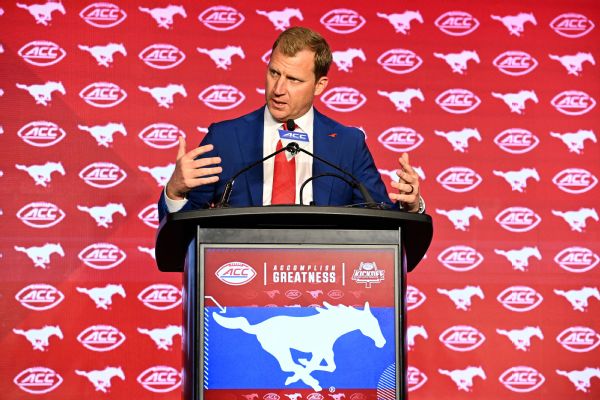

CHARLOTTE, N.C. — Rhett Lashlee isn’t naïve about the enormous challenge facing SMU as his team transitions to the Atlantic Coast Conference this season.
But that hasn’t dampened the third-year head coach’s confidence.
“It’s a jump,” Lashlee said. “We are moving up in weight class. We are going to learn a lot about our program and where we stand. We are excited about that. I do feel like we can compete and I will be very disappointed if we don’t.”
The Mustangs have known since last September that they were headed to the ACC, but he said being at the conference’s preseason media days Monday in Charlotte made it feel all the more real.
SMU is coming off an 11-3 season and an American Athletic Conference championship, earning a trip to the Fenway Bowl and finishing ranked 22nd in the AP Top 25 poll. But Lashlee acknowledged that facing an elite level of competition “week in and week out” will be this team’s biggest challenge.
He has some concerns about this team’s overall depth, particularly on the offensive and defensive lines. And he also acknowledged it might take time for the Mustangs to catch up to the other ACC schools on the recruiting front.
But he believes that’ll happen as the program receives more exposure from playing in the ACC this season.
Lashlee, who is 18-9 in two seasons at SMU, is familiar with the school’s rich football history, which includes developing stars such as Doak Walker and Eric Dickerson and winning 11 Southwestern Conference championships, and he thinks that helps in the transition.
“We have been at this level before,” Lashlee said. “We are different than a school that maybe has never been at the power level that gets the call-up versus a school that had it for a long time and had it taken away.”
SMU was a national power in the Southwestern Conference before the NCAA handed down a “death penalty” in 1987 for secret slush fund payments to players after multiple warnings. The NCAA canceled the 1987 season and the university opted not to return for 1988, a two-year hiatus that had major ramifications for the program.
Now the money is pouring in — legally, under new pay-for-play rules — to SMU, the only major college football program within a 30-mile radius to Dallas.
Earlier this month, SMU announced it had surpassed a $125 million fundraising goal since being added to the ACC along with Cal and Stanford. That comes as SMU forgoes nine years of media-rights distribution payouts from the ACC and doesn’t earn a full share until its 10th league season.
“It just speaks to the acknowledgement from our community, the SMU community, this isn’t just about athletics,” athletic director Rick Hart said. “This is an institutional moment. And it’s an incredible opportunity for SMU to elevate — institutionally, athletically, nationally — in ways that we’ve not been able to do before.”
Returning starting quarterback Preston Stone is among the players embracing the opportunity. He said he welcomes being thrust into the “uncomfortable situation” of moving up from what he called a middleweight class.
But he said having played against Oklahoma, Memphis and TCU last season has helped SMU prepare for the transition.
“Absolutely we will be able to compete right away,” Stone said. “Regardless of who we are playing, if we can show up and execute our game plan and play our football we have a chance to win every game on our schedule.”
The schedule makers didn’t do SMU any favors.
The Mustangs’ first two ACC games will come against defending champion Florida State on Sept. 28 at home, and at runner-up Louisville on Oct. 5.
“The league has a good sense of humor,” Lashlee joked. “We will learn real quickly where we stand.”
The Associated Press contributed to this report.










